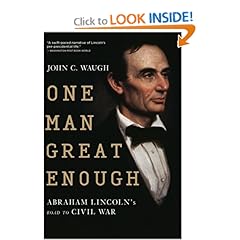Lincoln and Obama: Parallel Paths to Power
 Barack Obama evoked the Lincoln paradigm often after he became president-elect. He appeared to be going to the presidency in Lincoln’s way, following Lincoln’s footsteps, ringing both substantive and ceremonial changes in much the same way Lincoln had.
Barack Obama evoked the Lincoln paradigm often after he became president-elect. He appeared to be going to the presidency in Lincoln’s way, following Lincoln’s footsteps, ringing both substantive and ceremonial changes in much the same way Lincoln had.He journeyed to his inaugural from Philadelphia to Washington on the same rail route Lincoln rode to his inauguration. He was sworn in with his hand on the same Bible. Lincoln appointed his major rival for the nomination, William Henry Seward, his secretary of state. Obama appointed his major rival, Hillary Clinton, his secretary of state. The parallels were many, striking, and widely noted.
Not so widely noted, but even more striking, are the parallels in the rise to power of these two presidents—from obscurity to the political summit. Obama’s path to the presidency has replicated Lincoln’s in many ways, time after time, all down the line, before anybody had given it any thought, from the beginning of his political career to the present.
Although their political milieux were quite different, separated by a century and a half, their triumphs in their separate eras were remarkably the same. Both cut their teeth in Illinois politics. Both started in the Illinois legislature, and shaped their political careers exclusively in that great prairie state. Lincoln when elected had virtually no executive experience to recommend him to the most taxing executive job in the world. Obama had very little. Both proved themselves gifted with inordinate political smarts. Both were gifted with unusual eloquence.
Most striking of all, both seemed to explode on the national scene suddenly, from virtually nowhere. And both were catapulted into the public ken with career-launching speeches. Lincoln’s speech in New York’s Cooper Union hall in February 1860, thrust him overnight into serious presidential speculation. Obama’s keynote address to the Democratic National Convention in 2004 made him overnight an attractive potential presidential possibility for the future.
Both began their rise to the presidency as far-behind-the-field dark horses, two years before their ultimate election. Both were seen at first as brash upstart newcomers. Lincoln’s start began with his storied debates with Stephen A. Douglas in the 1858 race in Illinois for a United State Senate seat. Obama’s began when he decided to run for president after only two years in the U. S. Senate—some thought far too early. Both were then far back in the field, given little serious consideration as ultimate winners. Both began under the radar.
Yet more striking even than that parallel, was the similarity of the situation in the country they hoped to lead. Both arrived on the main stage coincidental with mind-numbing crises. Lincoln was running when the Union was being gripped by rebellion, secession, and dissolution--over the issue of slavery. If elected he would be have to deal with a terrible nation-shattering civil war. It was left to him to lead the country through it, out of it, and into reunion.
Obama was running as the country was plunging into the worst economic times since the Great Depression of the 1930s, charged with dealing with a disaster of a very different kind, but one just as nation- threatening as Lincoln’s.
Both were following two failed presidencies. Lincoln would have to pick up the pieces following the disastrous administration of James Buchanan, who as president had utterly failed to handle the slavery problem and had by his failure helped bring on the crisis. Obama would be following a virtually discredited George W. Bush, whose policies in large part had led to the economic crises now threatening the country.
Yet a final striking truth in the parallel paths of these two men to the presidency, is that neither one would ever likely have been elected president had their predecessor not failed. Neither would have ever been elected, in all probability, had the country not been in a terrible crisis. Neither would perhaps have had the opportunity.
In both cases the country needed something strikingly new and different. And Lincoln and Obama were both something strikingly new. In Lincoln’s case none of his three opponents in the canvass in 1860 represented something different. Stephen A. Douglas, leader of one wing of a divided Democratic Party, had been on the national stage nearly two decades and had been responsible for legislation in part that was causing the crisis over slavery. John Breckinridge, leading the other wing of the shattered party, had been vice president under Buchanan, and represented secessionist sentiment. A third party, seeking conciliation, was led by John Bell, a journeyman U. S. Senator from Tennessee, who had been long prominent in national politics. None of these men looked new and different.
Neither were Obama’s main opponents new. Hillary Clinton, his biggest threat for the Democratic nomination had long been front and center in the country’s political life, a U. S. senator and the very active wife of a controversial president before George Bush. She did not look like something new to the American electorate. Obama’s Republican opponent in the election itself, John McCain, was an old Senate hand who could not shake the burden he carried of a party discredited by the Bush years.
Because Lincoln and Obama were something new, and because the old had been so discredited, they were elected and handed their separate crises to deal with in their separate centuries.
Lincoln dealt with his crisis, overcame it, led the country back to reunion, and is now immortalized as perhaps the greatest president in our history. Obama is dealing with his crisis. Whether he will have the same success putting to rest his particular nation-threatening demons, nobody now knows.